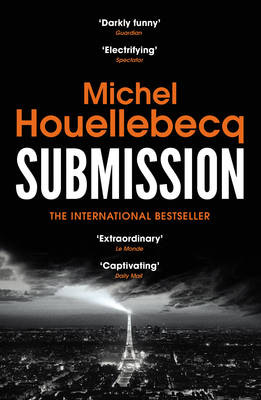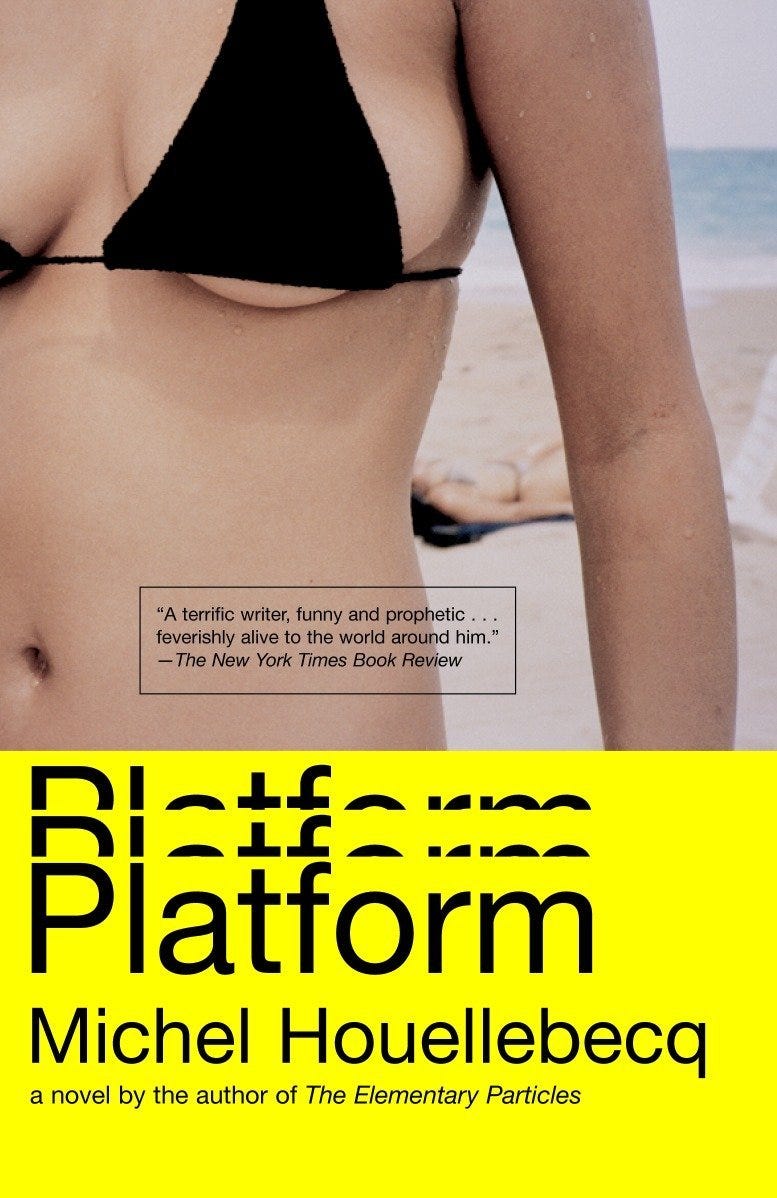Submission
The uncanny prescience of a 2015 novel in which an Islamic fundamentalist is elected president of France.
Hello and welcome to Issue 10 of Writing About Reading.
If you enjoy today’s letter, please hit the ❤️ and forward to a literary friend. If you want to comment, click the Comment button at the bottom of this email. And if someone forwarded this to you, why not subscribe? It’s zero money down, zero due at signing.
I’m currently reading Leave the World Behind by Rumaan Alam and Train Dreams by Denis Johnson (if you’ve read the last few issues, you know I’m on a Denis Johnson kick). On the television side, we’ve been watching “The Good Lord Bird” on Showtime, and I think it’s a perfect adaptation of James McBride’s excellent, hilarious novel.
But it’s difficult right now to think or talk about anything beyond what happened on Jan. 6, and what’s happening right now in America writ large. And although the Trump Era ends on Jan. 20, the aftershocks will remain for a very long time.
Over the past four years, political dystopias have been in vogue in fiction and on television, for obvious reasons. In 2017, The New Yorker declared a new “golden age for dystopian fiction,” including Omar El Akkad’s American War, which I wrote about in Issue 5.
“The Handmaid’s Tale” premiered on Hulu in 2017, the perfect timing, 32 years after the novel was published. The continued dystopian nature of real life created an ideal moment for Margaret Atwood to publish a sequel, The Testaments, in 2019. It was similarly perfect timing for Philip Roth’s 2004 novel The Plot Against America, in which Nazi sympathizer pilot Charles Lindberg is elected president and touts an “America First” agenda to keep America out of WWII.
Meanwhile in new fiction, Mark Doten’s smart 2019 novel Trump Sky Alpha imagines a nuclear war started by President Trump, who flies around in a zeppelin, broadcasting his own absurdist reality show from the sky. Gish Jen’s 2020 novel The Resisters paints a near future in which the wealthy elite live in comfort and answer to an Autonet (“Aunt Nettie”) that sounds a lot like Siri or Alexa (or the in-home telescreens of 1984), while the poor live in dilapidated houseboats and survive on a basic income.
Some of those novels felt a little too on the nose for our current situation. (The same goes for Lawrence Wright’s The End of October—why would I want to read about a fictional pandemic while living through a real one?)
The dystopian novel that has stayed with me most in the past few years, since I first read it in 2016, is Michel Houellebecq’s Submission, published in 2015 in France as Soumission. (The German is even better: Unterwerfung.)
The novel is set in France in 2022, when the country elects a Muslim Brotherhood candidate as its new president. Mohammed Ben Abbes (fictional) defeats the real-life far-right leader Marine Le Pen, and promptly institutes Sharia law: women stop wearing revealing clothes; men are encouraged to take multiple wives; schools separate boys from girls; professors are forced out unless they convert to Islam. The novel’s protagonist Francois is a professor at the Sorbonne, and when he returns from a hiatus spent in a monastery, the school has been renamed The Islamic University of Paris, and all of his colleagues have taken multiple wives.
I can’t quite call Submission a dystopia, which the dictionary defines as “an imagined state or society in which there is great suffering or injustice, typically one that is totalitarian or post-apocalyptic.” Dystopias are typically hellscapes. The twist of Submission isn’t that Ben Abbes gets elected, it’s the peaceful aftermath. The French happily submit to Islamic fundamentalism. That’s the book’s big punch line. Most people are happy with Ben Abbes’s regime. (Except for the Jews. They leave France.)
None of that sounds very funny, perhaps, but the novel is frequently hilarious, as are all of Houellebecq’s novels, if you can see the misogyny of his angry male characters as satire. (I’m not very interested in debating the real-life views and perceived offenses of the author himself, though many people detest him; I’m interested in the text.)
And none of that sounds like America over the past four years, perhaps, but the experience of a visiting professor at the University of Chicago, who assigned Submission in a European history seminar, is telling. Nathan Ristuccia wrote:
I discovered, to my shock, that in 2017, University of Chicago students did not read Submission as being about Islam. They read it as being about Trump. Trump’s name was never spoken. Yet he haunted the classroom, lurking behind pregnant looks and awkward laughter. “Centrists are pathetic,” said one student, explaining why the novel’s mainstream French politicians lose to the Muslim Brotherhood and the National Front. “All the energy today is in radicalism.”
I had the exact same reaction when I read the novel in 2016: I read it as being about Trump. Not intentionally about Trump, since it was written before Trump was even a candidate. But history can color a piece of fiction differently, and after four years of Trump, Submission reads to me as prescient.
That’s not to say Ben Abbes is Trump. He’s actually more like Emmanuel Macron. As Nathan Ristuccia writes, Ben Abbes sounds like a voice of “reason, moderation, economic centrism, and European integration: Emmanuel Macron with headscarves.”
Ben Abbes sweeps into power through charm, touting a return to faith and traditional values. “His real stroke of genius was to grasp that elections would no longer be about the economy, but about values,” Francois says. Ben Abbes “campaigned on family values, traditional morality and, by extension, patriarchy.”
Trump campaigned on bluster and insults. He occasionally referenced his Christianity, but everyone knows his faith is fake—look no further than the stunt when Ivanka handed daddy a Bible from her $1,500 Max Mara purse and he proceeded to hold it aloft, upside down. (In a 2019 Bloomberg interview, Trump could not cite a single specific Bible verse.)
But Trump also succeeded. And as different as Ben Abbes is from Trump on paper, Houellebecq’s fictional France, after electing an Islamic fundamentalist, has strong shades of America during the Trump presidency. As NPR wrote in 2015, “Few will disagree that Michel Houellebecq's Submission… is a novel of ideas — even though most of them are deeply discomfiting if not downright offensive.”
Okay, here a brief digression about Houellebecq’s body of work, and his reputation, may be necessary.
My first Houellebecq was Platform (2001), which I read in 2013 after the cover caught my eye. (Again: covers matter!) It was scathing, hilarious, and then, in its violent climax, devastating. It’s about a lonely forty-something man who takes a trip to Thailand, meets a beautiful woman and has lots of sex with her—and then a terrorist event happens.
I immediately read The Elementary Particles (1998) (published in the U.K. with the title Atomised, for some reason), about two sex-obsessed brothers, and liked that too.
I would come to learn this is the basic formula of every Houellebecq novel: An angry, self-pitying, sex-obsessed man (“In the end, my cock was all I had,” Francois reflects in Submission) has a few sexual flings, or has no sex but ruminates sadly about past sexual flings, all amid the backdrop of a political shift that crescendoes in a violent political event. (The New York Times wrote in 2018 that Houellebecq “understood what it meant to be an incel long before the term became common.”)
But there’s a lot of humor along the way, as well as trenchant observations about sex, culture, and politics. For example, Valerie, the (disillusioned) love interest in Platform, tells the protagonist: “The men I know are a disaster, not one of them believes in love; so they give you this big spiel about friendship, affection… I’ve reached the point where I can’t stand the word ‘friendship’ anymore, it makes me physically sick. Or there’s the other lot, the ones who get married, who get hitched as early as possible and think about nothing but their careers afterwards. You obviously weren’t one of those; but I also immediately sensed that you would never talk to me about friendship, that you would never be that vulgar.” (The word “vulgar” is doing strong work there.)
Although Houellebecq’s men can be brutal in their assessments of women, they are at least also equally hard on themselves. They are painfully self-aware. The protagonist of his newest novel Serotonin (2019), before meeting up with an old girlfriend for coffee many years after they dated, asks the reader, “Did I really want to know what had become of Claire? Probably nothing very brilliant… The meeting of two forty-year-old losers and former lovers could have been a magnificent scene in a French film, with the appropriate actors—let’s suggest Benoit Poelvoorde and Isabelle Huppert for the sake of argument; in real life, was that what I wanted?”
Yes, his humor will offend the easily offended. In Platform, a man in a bar remarks, “All anti-Semites agree that the Jews have a certain superiority. If you read anti-Semitic literature, you will be struck by the fact that the Jew is considered to be more intelligent, more cunning, he is credited with having singular financial talents, and greater communal solidarity. Result: six million dead.” I can laugh at that, though I can think of specific people in my life who would not. (The joke could also be written as: “Hitler was just jealous.”)
Houellebecq in real life, like his characters, has said controversial and offensive things. And every time he publishes a new novel, reviewers devote much of their word counts to enumerating his past offenses and provocations. He once called Islam the “stupidest religion”; he has been sued by Muslim groups; he has been accused of Islamophobia and anti-Semitism alike. But in an era of daily ad hominem attacks by the President of the United States, I can’t gather the energy to be triggered by Houllebecq.
Submission had the misfortune of being published in France on Jan. 7, 2015, the day of the terrorist attack on the French satirical paper Charlie Hebdo, something Houellebecq could not have foreseen—and a cartoon of Houellebecq was on the cover of that week’s issue. The terrible timing killed the book’s rollout, and then-Prime Minister Manuel Valls even said on TV that day, “France is not Michel Houellebecq. It is not intolerance, hate, and fear.”
Serotonin depicts a farmers’ revolt toward its conclusion that looks a lot like the Yellow Vest protests in France in 2018, even though the novel was written before those events. In a review of Serotonin, Quillette asked whether Houellebecq is “prophet or troll.”
Amidst all the controversy, there is still something close to consensus around his talent and his predictive abilities. As the Times wrote, “While Houellebecq has always been a polarizing figure — admired for his provocations, disdained for his crudeness — he has turned out to be a writer of unusual prescience.” (In Platform, the protagonist says, “I had never considered elections as anything more than excellent television shows,” presaging the ultimate reality television president.)
To return to Submission: What has stuck with me, and what interests me most, is the concept of submission.
Francois observes his country’s embrace of Islam with mild shock, then inevitable acceptance. When a fellow professor who has converted to Islam tries to convince Francois to convert, he uses the French bondage novel The Story of O to illustrate his case: “It’s submission. The shocking and simple idea, which had never been so forcefully expressed, that the summit of human happiness resides in the most absolute submission.”
Salman Rushdie describes the same effect, with almost exactly the same language, in The Satanic Verses. After Mahound (Rushdie’s stand-in for Mohammed) returns to Jahilia from Mount Cone with a revelation about false verses, Abu Simbel, the Grandee of Jahilia, “institutes a policy of persecution,” Rushdie writes. “The name of the new religion is Submission… its adherents must submit to being sequestered in the most wretched, hovel-filled quarter of the city; to a curfew… And, by one of the familiar paradoxes of history, the numbers of the faithful multiply, like a crop that miraculously flourishes as conditions of soil and climate grow worse and worse.”
Trumpism is a form of submission. His supporters submit wholly and passionately. They attempted an insurrection in his name. (Now they’d like him to pardon them.) Republicans like Lindsey Graham happily submitted—better to sacrifice your own values to stay in power, and in the chief’s good graces—than stand for something.
The rest of the country also submitted, I’d argue, in a different way: to the relentless daily Trump news cycle. To the tweets that moved markets. To the public insults (Rosie O’Donnell was a “disgusting” “fat” “slob”; Mika Brzezinski was “bleeding badly from a facelift”), and the barbs about foreign leaders (“little rocket man”).
As Andrew Sullivan wrote in in February 2017, just one month into the Trump presidency, “One of the great achievements of free society in a stable democracy is that many people, for much of the time, need not think about politics at all. The president of a free country may dominate the news cycle many days — but he is not omnipresent — and because we live under the rule of law, we can afford to turn the news off at times… In that sense, it seems to me, we already live in a country with markedly less freedom than we did a month ago.” (Political think-pieces roasted this as a bad take that expresses a longing for political apathy, but I didn’t read it that way.)
We became inured. Yes, people kept tweeting “This 👏 is 👏 not 👏 normal!” and “RESIST!” but it stopped meaning much.
Then Trump lost reelection, and still those who had submitted did not believe it. Then, Jan. 6 happened, and many of those who submitted appeared to snap out of it, like emerging from a long stupor. Big Tech platforms, which submitted and enabled the invective for four years, shut off Trump’s faucet at the eleventh hour in a vacuous appeal to the incoming Dems about to take power. (Please withhold your applause.)
Houellebecq’s ultimate joke in Submission is that it feels good to submit. (To quote 1984: “He loved Big Brother.”) But what about the casualties?
At the end of Plot Against America, Lindbergh vanishes, Roosevelt becomes president again, and as Washington Post book critic Ron Charles wrote this week, “It's as though the paroxysm of violence that tore across the country never happened.” Except for the Newark Jews whose lives were shattered.
Roth’s seemingly tidy ending, Charles writes, “anticipated with eerie accuracy the efforts of many politicians like Rep. Jim Jordan (R-Ohio) and Sen. Ted Cruz (R-Tex.). They spent months flaming the rage of Trump’s racist thugs, but hours after the deadly assault on the Capitol, these same politicians started insisting that we must quickly move on, forget the president’s culpability and learn nothing.”
--
Thanks for reading my writing about reading today. If you enjoyed, please share on social media or forward the email to friends.





